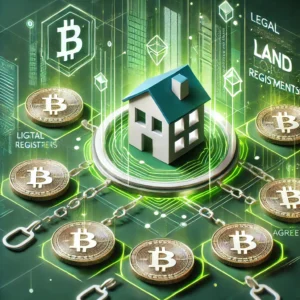The way people invest in real-world assets is changing fast. Tokenization is breaking down barriers by turning traditionally illiquid assets, like real estate, into digital tokens that can be easily bought and sold. Tokenized real estate is a key component of the broader real-world asset (RWA) tokenization movement, which is rapidly gaining traction. Onchain RWAs have hit an all-time high of $17.1 billion, with over 82,000 total asset holders. Analysts predict the market could grow 50-fold by 2030, potentially reaching $30 trillion. In Europe, governments are launching tokenization initiatives, and establishing legal frameworks to support the growth of this innovative investment model.
Bridging the Gap Between Blockchain and Traditional Legal Systems
Blockchain-based real estate platforms, such as Blocksquare, are taking tokenization a step further. Unlike many tokenization projects that create mere digital representations of assets, Blocksquare integrates directly with land registries through notarized agreements. This connection to land registries was the missing link in previous tokenization efforts. It enables investors to have a direct legal claim tied to real estate value, offering a level of protection that was previously absent. With this integration, investors don’t just hold tokens—they possess enforceable economic rights tied to real-world assets.

Denis Petrovcic, CEO of Blocksquare, highlights this innovation as a solution to a major challenge in real estate tokenization:
“This might just be the holy grail of real estate tokenization — finally providing investors with strong legal recourse, ensuring they are not just holding digital representations but real, directly enforceable economic rights.”
A Booming Market for Real-World Assets
For years, real estate investment was only accessible to those with significant capital. Now, tokenization is allowing individuals to invest in real estate with smaller amounts, similar to how stock trading democratized company ownership. Blocksquare’s framework plays a crucial role in bridging the gap between blockchain-based assets and the long-standing legal protections of traditional finance, providing both new and experienced investors with the confidence to participate. Blocksquare’s model could serve as a catalyst for the broader adoption of tokenization across various asset classes.
Tokenized real estate is part of the larger real-world asset (RWA) tokenization movement, which is gaining momentum. Onchain RWAs have reached an all-time high of $17.1 billion, with over 82,000 asset holders. Analysts predict that this market could grow 50-fold by 2030, potentially reaching $30 trillion. With more institutions eyeing this space, real estate tokenization is poised to become a major force in global finance.

The Growing Role of Tokenization in Real Estate Investment
Europe is making significant strides in embracing tokenization, with its regulatory frameworks evolving to provide the clarity needed for blockchain-based asset markets to flourish. Initiatives like the Markets in Crypto-Assets Regulation (MiCA) are creating a stable legal environment for tokenized real estate platforms to thrive. This regulatory support is essential for fostering investor confidence and attracting institutional players. By combining blockchain’s transparency with well-established legal protections, Europe is positioning itself as a leader in the global tokenization movement.
The future of real estate investment lies in the widespread adoption of tokenization. As blockchain technology integrates further into financial systems, tokenized real estate could become a cornerstone of global finance, driving innovation in asset management and trading. Tokenization also has the potential to reshape other sectors, such as art, commodities, and intellectual property, marking a significant evolution in the digital economy. Europe’s forward-thinking approach to blockchain and tokenization ensures it is well-positioned to lead this emerging market.
Stay informed,
Rodcas Consulting Group
